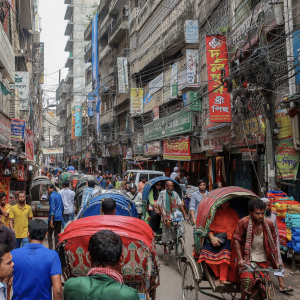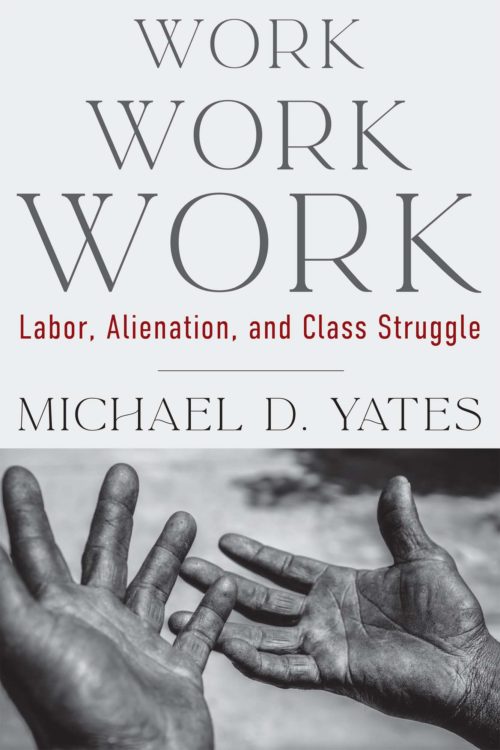Work Work Work
By Michael Yates
216 pages / $19 / 978-1-58367-965-4
Reviewed by Farooque Chowdhury
….Michael Yates makes a clear statement: Work today is “a profoundly alienating endeavor, and it must be abolished if human beings are to thrive, and the world is not to succumb to environmental disaster. We may have to stop using the word ‘work’ itself, or perhaps employ it only to describe a forgettable past.”
It’s a lofty dream: Describing “work” becoming “a forgettable past.”
His outline of the dream: We produced and distributed “collectively, in an egalitarian manner, for most of our time on Earth as a natural part of life. There is no reason why we cannot do this again, although for this to happen, every institution of modern society will have to give way to something radically different. We do not have to ‘work,’ only to produce. If this book helps readers understand that these two words are not the same and that the first must give way to the second, it will have served its purpose.If further, it gets some people to ask why we cannot all perform meaningful labor that helps us develop our capacities as thinking, acting, social human beings, it will have been a triumph.”
Exploiting societies dehumanize humanity. They take away our capacity to aspire to a better life, command with tricky mechanisms to see all around according to the masters’ wishes, disallow human beings to think, prevent people to act for bettering life, and they cripple humanity by compelling us to work only for the masters. Whatever work is done is all for the masters, and nothing meaningful to human life. Masters brutishly bask in the fruits of work of the multitude. The masters beastly rehearse to fatten their bellies.
Work Work Work is “about work and those who perform it, almost always in the employ of people richer and more powerful than they.”
It, therefore, is also about, to much extent, the rich and the powerful. When one looks at the workers, the exploiters are their reverse image – the way the machine of exploitation moves on, the way the gears of the machine are moved faster, the way the machine shreds the life of the workers.
Work Work Work sounds similar for working boys in many countries. Anyone can find them at any hub of exploitation and profit making. A visit to the Tipu Sultan Road or the Dolaai Khaal or Taatee Bazaar area in the capital city of Dhaka, a visit to automobile repair shops around Dhaka or to the marine vessel making yards along the Buriganga near Dhaka will find them. Boys picking torn papers, discarded plastic pieces of innumerable shapes and sizes from street sides, tearing down old posters from walls of the city buildings, looking for whatever is saleable in garbage heaps, selling kitchen items or flowers from morning to night, until may be 10 or 11 PM. Their earning is so little!
It’s so little that it turns a difficult arithmetic to find out the technique by which they manage their life and their family. But, this is a fact, a factual mathematics in exploiting society.
It’s not only a Dhaka-face. It’s universal in exploiting societies. The name changes, the appearance changes, the age changes only. But, the brutalities of life persist doggedly. It’s the power of exploiting system. They and the system are regularly forgotten, however.
The author narrates his experience of work:
It was 1958, and my pay was $6.00 every two weeks. I received additional money for collecting the monthly bills of those who bought the local newspaper and two Pittsburgh dailies. The U.S. minimum hourly wage in 1958 was $1.00. In two weeks, I worked for approximately twenty-five hours, making my hourly compensation twenty-four cents. Even as a young boy, I found this unacceptable. Knowing that no one else could do this route unless I trained them, I went to the newsstand whose owners were my bosses and demanded a raise. To my surprise, they agreed to a new wage of $9.00 every two weeks. This meant my pay was now thirty-six cents an hour, which was still far below the minimum wage. But it was high enough to keep me on the job. I kept at it for five years, enduring bad weather, nasty customers, vicious dogs, and eternally sore shoulders. It imprinted on my mind that work was hard and not particularly rewarding, and most of all, that those who hired you got more out of your labor than you did.
Between the ages of sixteen and twenty-three, there were other jobs: night watchman at a state park, grading papers for a college teacher, selling insurance to college classmates, counseling at a summer camp for inner-city kids, and clerical work at the Pittsburgh Plate Glass plant where my father worked.
It was a boy’s struggle with work, wage, and also with life. For millions, the same struggle along the same path. The questions related to these are the same.
The narration moves into a more complex area – the area of labor’s struggle: “In college and graduate school, I took an interest in labor unions and labor markets.”
The following description brings in the hard issues:
I majored in economics, and the instruction in labor economics focused on the choices people make when selling their labor capacity. Prospective workers decided whether to invest in their ‘human capital’ — mainly education and training — so that they would become more productive, compelling employers, as mainstream (neoclassical) theory dictated, to grant them higher wages. Employers were passive agents, with their choices dictated by a single-minded desire to maximize profits. If one set of employees earned more than another, it was because they had chosen to make the necessary human capital investments. A second choice was the amount of work people were willing to do. Some had high ‘leisure preferences’ and would work less, while others had low preferences and would work more.
The issues include labor capacity, education, productivity, wage, profit.
The labor economist writes:
Thus, the outcomes in the labor market were the result of the free choices people made. And although there likely would be considerable inequality in outcomes, this was a mirage, in that those with higher wages had incurred costs to get them. In fact, the economists could show that over the long run, to give one example, a physician and a hospital orderly made exactly the same true wage, one that factored in the difference in the costs the two workers had undertaken to get their respective jobs. When it came to labor unions, the economists declared that their main impact was to interfere with the free choices of the demanders and suppliers of labor. Unions forced wages up beyond the workers’ productivity, compelling employers to hire fewer of them, generating socially undesirable unemployment. Unions, therefore, harmed the very persons they were presumed to be helping.
Two of my professors in graduate school did not subscribe to this way of thinking. The first, an ‘institutional economist,’ was part of a school that believed the market was but one institution affecting production and distribution. In his classes, we were shown that labor unions, one of modern society’s important institutions, are critical in wage and benefit determination, and they do many other things: threaten nonunion employers enough to make them raise wages and benefits; reduce inequality overall and between men and women and white and nonwhite workers; improve workplace health and safety; help members to enforce protective legislation; make the enactment of such laws more likely, and give workers a voice in their workplace circumstances. The second professor, a radical Marxist economist, explained how profits are not a cost of production — the price that had to be paid for the services provided by the owners of capital, as the neoclassical theory argued — but the direct result of the exploitation of the working class.
Profits aren’t a cost of production – the fact denied by the mainstream (MS) scholarship, and not discussed in detail by a part of labor organizers. Both of these help exploiting capital by hiding the source of profit; consequently, come benevolence, charity, donation, a “kindhearted”, but deceptive approach….
I have resisted the authority and power of employers most of my adult life. However, work in capitalist society is profoundly alienating. In the 1970s and ’80s, we at the University of Pittsburgh failed four times to unionize the faculty. These losses, combined with the ever-tightening control by administrators over our work, deepened my alienation. Teaching had once been enjoyable, but now it was not. I found myself angry all the time. A therapist told me I should try to retire with dignity. I took his advice, and as soon as I could withdraw money from my pension — a generous retirement plan was the one good thing the university offered me — without tax penalty, I did. Life has been much better outside the degradation that is the capitalist workplace. And I only wish every worker could escape it.
It’s a daring wish by Yates – every worker escape capitalism’s control, every worker should have a life where work is enjoyment for flourishing creativity, not having a chained life.
The chapter reaches near-conclusion with the telling of a painful fact: “Through our work and our spending, we consume ourselves and the natural world around us.” Many workers, many working earnestly so that the bosses can make more money aren’t aware that “we consume ourselves”. A group of economists fail to find this self-consumption for the sake of capital.
The “Introduction” concludes with the following daring dream: “I hope that those who read what I have written begin to think that enough is enough.”
“To think enough is enough” is standing up to challenge the system that survives by murdering all that’s humane.


Comments are closed.